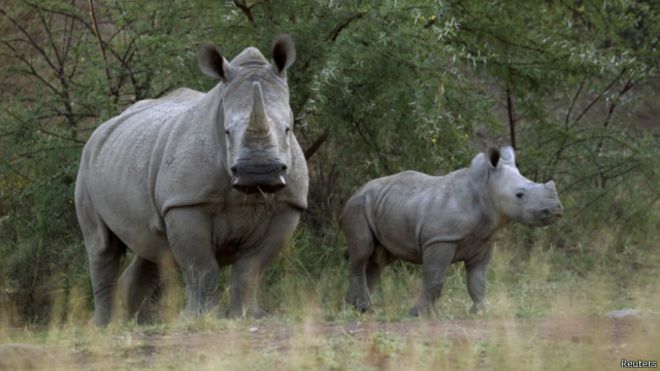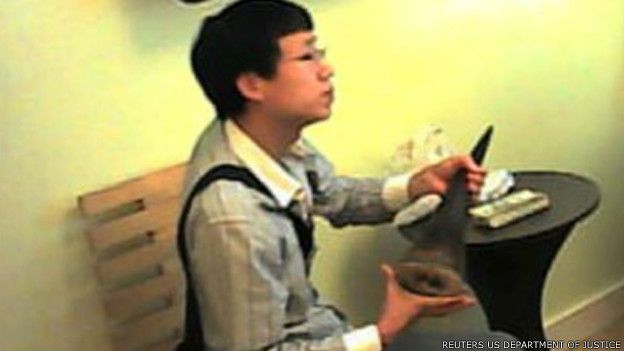美拍卖行东主走私犀牛角被判三年监禁
根据《雷斯法案》,美国联邦政府禁止非法获取、运输和买卖野生动物、鱼类和植物。
美国司法部声明说,位于佛州博因顿海滩的这家联邦法院,还要求这家拍卖行Elite Estate Buyers Inc的东主克里斯托弗·海斯(Christopher Hayes)向“雷斯法案奖励基金”支付150万美元罚金。法院还禁止这家拍卖行五年内从事野生动物成品买卖。
根据《雷斯法案》,美国联邦政府禁止非法获取、运输和买卖野生动物、鱼类和植物。
今年一月,海斯在迈阿密一家联邦法院认罪,承认自己参与非法出售犀牛角和象牙等禁止出口的野生动物成品,帮助走私客将濒危及受保护动物成品偷运至中国,并向美国渔业及野生动物管理局、海关和边境当局提供伪造记录和运货文件。
根据美国检方的资料显示,海斯透过其拍卖行至少卖出六具濒危的黑犀牛角,其中两具黑犀牛角被以80,500美元的价格出售给了得克萨斯州居民丘宁(Ning Qiu),然后再将犀牛角偷运至中国。
据悉,另外两具黑犀牛角被售予美国鱼类及野生动物管理局卧底探员,两一名卧底探员则从拍卖会上投得两具犀牛角。
美国检方称,海斯给外国买家介绍负责偷运非法出售的野生动物成品的第三方,后者负责向当局提交虚假文件并将濒危野生动物成品偷运出美国。
美国司法部声明说,2015年5月14日,得州居民丘宁因参与走私犀牛角和象牙至中国的活动被判25个月监禁。而另一名串谋走私、非法走私野生动物和制造虚假文书等罪行的主谋李志飞(Zhifei Li),亦在2014年5月底被纽沃克地方法院判处有期徒刑5年10个月。
声明说,以李志飞为首的这个团伙走私了30个犀牛角和象牙,以及用犀牛角制造的其它物品,总值达450万美元。
美国司法部声明还说,佛州拍卖行东主海斯还承认将犀牛角制品、象牙和受保护珊瑚制品出售给加拿大一个华裔古董商人关小炬(Xiao Ju Guan,音译)。而关则在没有许可的情况下,使用虚报文件,将这些物品邮寄至美国。2015年3月25日,关小炬被美国纽约法庭判刑入狱30个月。
美国司法部说,打击走私犀牛角和象牙的活动是司法部与鱼类与野生动物管理局特别调查小组联合展开。有关调查仍在继续。
Poaching Facts
http://www.poachingfacts.com/resources/wildlife-trafficking-news-archive/
Ringleader Of International Rhino Smuggling Conspiracy Pleads Guilty In New Jersey To Wildlife Trafficking Crimes
WASHINGTON – Zhifei Li, the owner of an antique business in China, pleaded guilty today to being the organizer of an illegal wildlife smuggling conspiracy in which 30 rhinoceros horns and numerous objects made from rhino horn and elephant ivory worth more than $4.5 million were smuggled from the United States to China.
The guilty plea was announced by Paul J. Fishman, U.S. Attorney for the District of New Jersey; Robert G. Dreher, the Acting Assistant Attorney General for the Environment and Natural Resources Division of the Department of Justice; Wifredo A. Ferrer, U.S. Attorney for the Southern District of Florida, and Dan Ashe, Director of the U.S. Fish and Wildlife Service (USFWS).
“The brutality of animal poaching, wherever it occurs, feeds the demand of a multibillion-dollar illegal international market,” said U.S. Attorney Fishman. “As a major hub of international commerce through our ports and busy airport, the District of New Jersey plays an important role in curbing the escalation of this devastating trade. Zhifei Li’s conviction is a warning to those who would be lured by the profits of dealing in cruelty.”
Li, 29, of Shandong, China, the owner of Overseas Treasure Finding in Shandong, pleaded guilty today before U.S. District Judge Esther Salas in Newark, N.J., to a total of 11 counts: one count of conspiracy to smuggle and violate the Lacey Act; seven counts of smuggling; one count of illegal wildlife trafficking in violation of the Lacey Act; and two counts of making false wildlife documents.
Li was arrested in Florida in January 2013 on federal charges brought under seal in New Jersey and shortly after arriving in the country. Before he was arrested, he purchased two endangered black rhinoceros horns from an undercover USFWS agent in a Miami Beach hotel room for $59,000 while attending an antique show. Li was arrested as part of “Operation Crash” – a nationwide effort led by the USFWS and the Justice Department to investigate and prosecute those involved in the black market trade of rhinoceros horns and other protected species.
In papers filed in Newark federal court, Li admitted that he was the “boss” of three antique dealers in the United States whom he paid to help obtain wildlife items and smuggle them to him via Hong Kong. One of those individuals was Qiang Wang, aka “Jeffrey Wang,” who was sentenced to 37 months in prison on Dec. 5, 2013, in the Southern District of New York. Li played a leadership and organizational role in the smuggling conspiracy by arranging for financing to pay for the wildlife, purchasing and negotiating the price, directing how to smuggle the items out of the United States, and obtaining the assistance of additional collaborators in Hong Kong to receive the smuggled goods and then smuggle them to him in mainland China.
“The take-down of the Li smuggling ring is an important development in our effort to enforce wildlife protection laws. Rhino horn can sell for more than gold and is just as rare, but rhino horn and elephant ivory are more than mere commodities. Each illegally traded horn or tusk represents a dead animal, poaching, bribery, smuggling and organized crime,” said Acting Assistant Attorney General Dreher. “The Justice Department will continue to vigorously enforce the law designed to protect wildlife. This is a continuing investigation.”
“The illegal trade in rhino horn has devastated the wild population of these magnificent animals; with the real possibility emerging that all sub-species will be extinct in the wild within our lifetimes,” said U.S. Attorney Ferrer. “Additionally, the poaching activities have cost the lives of enforcement rangers and wardens as the traffickers have resorted to greater levels of violence to feed the black market. This case reflects the seriousness with which we regard these activities and our commitment to work collectively to quash the conduct and hold the law-breakers accountable.”
“The staggering prices paid for rhino horn by criminals like Zhifei Li and his accomplices ensure that unscrupulous poachers continue to slaughter these animals, and it’s our hope that his conviction serves as a warning to other traffickers of the severe consequences they face,” said Fish and Wildlife Service Director Ashe. “The unparalleled greed of criminal trafficking rings like Li’s fuel the poaching epidemic that is decimating rhinoceros populations in the wild. Regardless of whether the horns he smuggled were sawed off the corpse of a rhino last year or a decade ago, each one represents the death of one of the world’s most endangered animals.”
Rhinoceros are a herbivore species of prehistoric origin and one of the largest remaining mega-fauna on earth. They have no known predators other than humans. All species of rhinoceros are protected under United States and international law. Since 1976, trade in rhinoceros horn has been regulated under the Convention on International Trade in Endangered Species of Wild Fauna and Flora (known as CITES), a treaty signed by over 170 countries around the world to protect fish, wildlife and plants that are or may become imperiled due to the demands of international markets.
In pleading guilty, Li admitted that he sold 30 smuggled, raw rhinoceros horns worth approximately $3 million – approximately $17,500 per pound – to factories in China where raw rhinoceros horns are carved into fake antiques known as Zuo Jiu (which means “to make it as old” in Mandarin. In China, there is a centuries old tradition of drinking from an intricately carved “libation cup” made from a rhinoceros horn. Owning or drinking from such a cup is believed by some to bring good health, and true antiques are highly prized by collectors. The escalating value of such items has resulted in an increased demand for rhinoceros horn that has helped fuel a thriving black market, including recently carved fake antiques.
According to the charges, plea agreement and a detailed joint factual statement filed in in Newark federal court:
The investigation of Li began in November 2011, after a confidential informant sold two raw rhino horns to a middleman at the Vince Lombardi rest stop on the New Jersey Turnpike in an Operation Crash undercover sale. These government-supplied rhino horns were, in turn, sold to a Long Island City antiques dealer who was working for Li.
At Li’s direction, raw rhino horns were hidden by wrapping them in duct tape, hiding them in porcelain vases and falsely describing them on customs and shipping documents, including by labeling them as porcelain vases or handicrafts.
Li purchased 25 raw rhino horns, including 13 endangered black rhinoceros horns weighing approximately 151 pounds, through connections in New York and New Jersey, and another five raw rhino horns weighing at least 20 pounds through an accomplice in Dallas, Texas.
Li sold whole rhino horns to factories where they would be carved into fake antiques. The leftover pieces from the carving process were sold for alleged “medicinal” purposes even though rhino horn is made of compressed keratin, the same material in human hair and nails and has no proven medical efficacy.
Between 2011 and 2013, Li purchased approximately 60 carved ivory items from U.S. auction houses with an approximate market value of $500,000, all of which were smuggled to China at Li’s direction.
Before arriving in Miami, Li sent a text message to the Long Island City antiques dealer saying that he had as much as $500,000 to spend in the U.S. on antiques and rhino horn. When purchasing two rhino horns from an undercover USFWS agent at a Miami Beach hotel, Li told the covert agent that he was interested in buying more rhino horns regardless of quality, as much as the agent could find, and inquired if the horns could be shipped directly to Hong Kong.
In April 2012, after a Dallas-based accomplice purchased a large, eight-pound raw rhino horn for Li in Florida worth more than $140,000, Li sent the dealer an email directing him to cut the horn into two pieces, wrap them in electrical tape, and send them to Hong Kong in separate packages. The email included a photo of the rhino horn with a red line drawn though it indicating where the lengthy horn should be cut.
After Li’s conspirator in Long Island City purchased two raw elephant tusks for Li weighing more than 100 pounds, Li sent instructions by email that the shipper should declare the contents as “automobile parts” and not use the word “tusk” on the shipping documents.
Li smuggled libation cups carved from rhinoceros horns from the U.S. to Hong Kong. Rhino carvings valued as much as $242,500 were sold to Li’s customers in China. In early 2013, one of those customers, Shusen Wei, pleaded guilty in the Southern District of Florida to knowingly buying a smuggled rhino carving from Li.
The plea agreement requires Li to forfeit $3.5 million in proceeds of his criminal activity as well as several Asian artifacts. Also, various ivory objects seized by the USFWS as part of the investigation will be surrendered. The maximum potential penalty is 10 years for each of the smuggling counts and five years for each of the other offenses, as well as a $250,000 fine per count, or twice the gross gain or loss from the offense. Sentencing before Judge Salas has been scheduled for April 1, 2014.
The investigation is continuing and is being handled by the U.S. Fish & Wildlife Service’s Office of Law Enforcement, the U.S. Attorney’s Office for the District of New Jersey, the U.S. Attorney’s Office for the Southern District of Florida and the Justice Department’s Environmental Crimes Section.
The government is represented by Assistant U.S. Attorneys Kathleen P. O’Leary and Barbara Ward of the New Jersey U.S. Attorney’s Office Criminal Division and Asset Forfeiture and Money Laundering Unit, Assistant U.S. Attorney Thomas Watts-FitzGerald of the U.S. Attorney’s Office for the Southern District of Florida and Senior Counsel Richard A. Udell of the Justice Department’s Environmental Crimes Section of the Environment and Natural Resources Division.
13-475
Defense counsel: Gary Cutler Esq., New York
Li, Zhifei Superseding Information
Li, Zhifei JFS
Li, Zhifei JFS Exhibits
Li Exhibt 1
Li Exhibit 1a
Li Exhibit 2
Li Exhibit 7
Li Exhibit 10
Li Exhibit 10a
Li Exhibit 11
Li Exhibit 12


